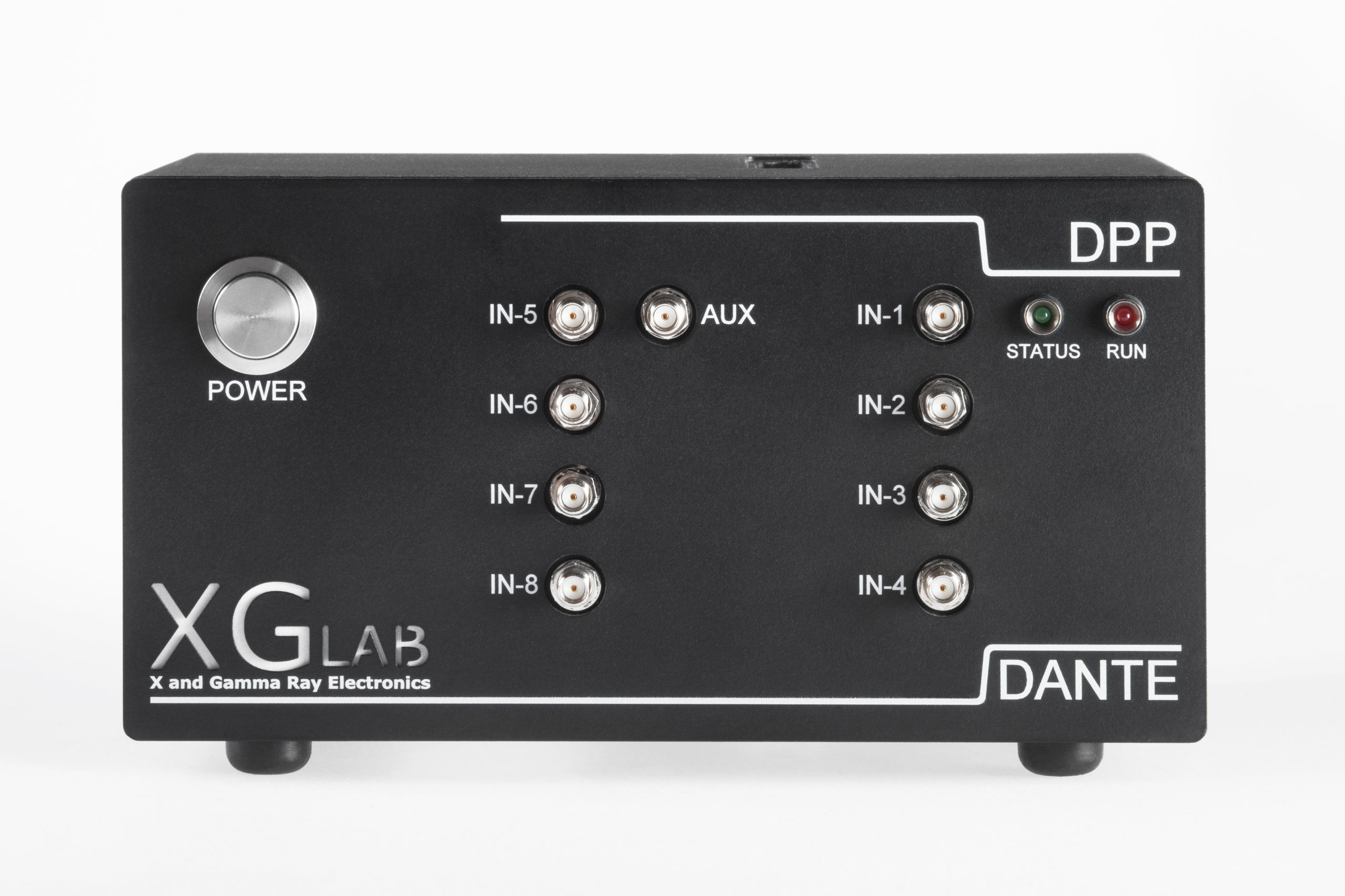
XGLAB DANTE¶
DANTE is a Digital Pulse Processor specifically designed for X-ray spectroscopy (https://www.xglab.it/products/dante/). It can control up to 8 detector channels on one controller. Configuration is performed using windows software provided by XGLAB. Configuration files are HDF5 file (do not use the YML ones) which can be saved after performing an acquisition.
Bliss access the controller using an ethernet address. To set it up, you will need to connect the controller via USB on a windows PC. Then, using the DANTE software, you can assign it an IP address.
The XGLabDante controller in bliss has support for all MCA triggering modes (soft, trigger, gate). DANTE supports a mapping mode which can be used in continuous scans.
Bliss YAML configuration¶
- name: xglab
module: mca
class: XGLabDante
url: 192.168.1.120
configuration_directory: /users/opid00/mca_config
Above example works in case there is a __init__.yml in the same directory containing:
plugin: bliss
Loading DANTE configuration file¶
Getting the list of available configurations:
XGLABTEST [2]: xglab.available_configurations()
Out [2]: ['Config_ch3478.hdf', '220926_test2_8chs_pulser10k.hdf', '220926_test1_pulser10k.hdf', 'Config_ch12.hdf', 'config.hdf']
XGLABTEST [3]:
Loading a configuration:
XGLABTEST [3]: xglab.load_configuration("Config_ch12.hdf")
XGLabDante[xglab] Loading configuration [Config_ch12.hdf] ...
XGLabDante[xglab] 2 boards configured
XGLABTEST [4]:
Checking current configuration:
XGLABTEST [4]: xglab.current_configuration
Out [4]: 'Config_ch12.hdf'
XGLABTEST [5]:
Standard info also prints out current configuration and active channels:
XGLABTEST [1]: xglab
Out [1]: MCA:
object: <class 'bliss.controllers.mca.xglab_dante.XGLabDante'>
Detector brand : XGLAB
Detector type : DANTE
Acquisition mode : MCA
Spectrum size : 4096
trigger mode : SOFTWARE
preset mode : REALTIME value=0.1
ROIS:
Name start end
------ ------- -----
roi1 0 512
roi2 0 1024
DANTE:
configuration directory : /users/opid00/mca_config
current configuration : Config_ch3478.hdf
active channels : [2, 3, 6, 7]
Accessing DPP configuration from bliss¶
From the bliss shell, you can access DPP parameters for each channel:
XGLABTEST [5]: xglab.dppconfig
Out [5]: DPP CONFIG for channels : [0, 1]
- access one board config using dppconfig[channel]
- set parameter to all boards using dppconfig.set(name, value)
XGLABTEST [6]: xglab.dppconfig[1]
Out [6]: DPP CONFIG on channel #1:
.base_offset = 0
.baseline_samples = 64
.edge_flat_top = 1
.edge_peaking_time = 4
.energy_filter_thr = 25
.fast_filter_thr = 50
.flat_top = 7
.gain = 1.0
.inverted_input = False
.max_peaking_time = 0
.max_risetime = 30.0
.other_param = 0
.overflow_recovery = 0
.peaking_time = 25
.reset_recovery_time = 300
.reset_threshold = 1000
.tail_coefficient = 0.0
.time_constant = 0.0
.zero_peak_freq = 5.0
You can access or modify parameter on each channel individually:
XGLABTEST [7]: xglab.dppconfig[1].peaking_time = 20
XGLABTEST [8]: xglab.dppconfig[1].peaking_time
Out [8]: 20
XGLABTEST [9]: xglab.dppconfig[0].peaking_time = 25
You can also set the same parameter value on all channels:
XGLABTEST [9]: xglab.dppconfig.set("peaking_time", 25)
After modifying one or more parameters, you need to apply these parameters on the controller. This is not done automatically.
XGLABTEST [10]: xglab.apply_dppconfig()
Apply dpp configuration on board #0
Apply dpp configuration on board #1
XGLABTEST [11]: